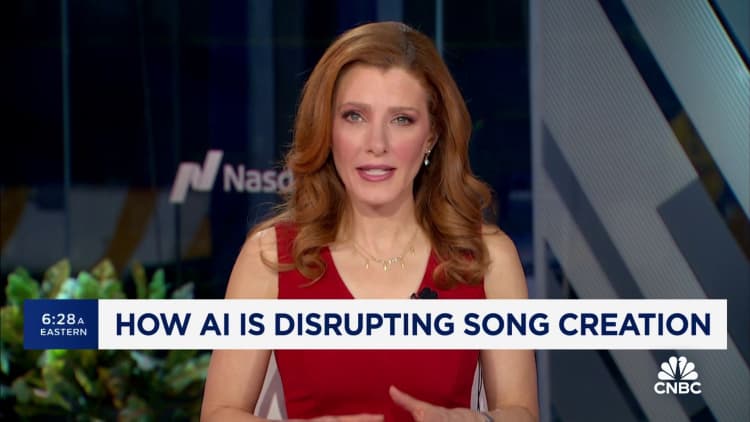AI-generated music is going viral. Should the music industry worry?
The growing prevalence of AI music has caused a stir across the music industry, according to Keith Mullin, head of management and music industry course leader at the Liverpool Institute for Performing Arts.
Da-kuk | E+ | Getty Images
With more than 1 million monthly listeners on Spotify, psychedelic rock band The Velvet Sundown is raking in thousands of dollars and has the music industry asking itself tough questions 一 and they’re not about whether the ’70s are coming back.
The “band” was recently confirmed to primarily be the work of generative artificial intelligence 一 something that had been heavily suspected in light of a suspiciously smooth and glossy image of its “band members” and derivative song titles like “Dust on the Wind.”
The Velvet Sundown’s bio on Spotify now clarifies that it is a “synthetic music project guided by human creative direction, and composed, voiced, and visualized with the support of artificial intelligence.”
It adds, “This isn’t a trick – it’s a mirror. An ongoing artistic provocation designed to challenge the boundaries of authorship, identity, and the future of music itself in the age of AI.”
However, in CNBC’s conversations with various music professionals, descriptors like “soulless,” “stifling,” and “creepy” surfaced, as the industry grapples with the encroachment of AI.
While AI tools have long been integrated into music software like Logic, newer AI-powered platforms such as Suno and Udio have made it easier than ever to generate entire songs based on nothing more than a few prompts and inputs.
As a result, “The Velvet Sundown” is far from the only AI-generated artist emerging online. There’s evidence that other upstarts like “dark country” musician Aventhis — with more than 600,000 monthly listeners on Spotify — are also a product of AI-generated voices and instruments.
Meanwhile, France-headquartered music-streaming service Deezer, which deployed an AI detection tool for music in January, revealed in April that about 18% of all tracks being uploaded to its platform are fully generated by AI.
AI music tech advances
The quality and originality of AI music have often been criticized, but experts say that as generative AI becomes more sophisticated, it’s becoming harder and harder for the average listener to distinguish between human and machine.
“[The Velvet Sundown]” is much better music than most of what we’ve heard from AI in the past,” Jason Palamara, an assistant professor of music technology at the Herron School of Art and Design, told CNBC.
“Early versions could be used to make catchy, repetitive hooks … But we’ve gotten to the point where AI is putting out songs that actually make sense structurally, with verses, choruses and bridges,” Palamara said.
He added The Velvet Sundown is likely just the “tip of the iceberg” of what’s coming. Suno and Udio — the current “gold standard” of genAI platforms — come with few to no barriers to entry, allowing anyone to create hundreds of AI tracks in one sitting.

Both platforms offer free access, as well as premium subscriptions priced at about $30 or less a month.
But while creating an AI song can be done for free, that doesn’t mean it can’t generate revenue. The Velvet Sundown has made about $34,235 over a 30-day period across all audio streaming platforms, according to estimations from ChartMasters’ streaming royalties calculator.
Because of that, it’s easy to see why AI creators might want to flood streaming platforms with as much generated music as possible, hoping to go viral.
‘We can’t predict yet’
The growing prevalence of AI music has caused a stir across the music industry, according to Keith Mullin, head of management and music industry course leader at the Liverpool Institute for Performing Arts.
“It’s the hot topic of the moment, especially in relation to copyright and digital service providers like Spotify,” said Mullin, who is also the guitarist for Liverpool rock band The Farm.
Major record labels such as Sony Music, Universal Music Group and Warner Records have launched lawsuits against Suno and Udio, accusing them of mass copyright infringement. Meanwhile, thousands of musicians and creatives have called for a prohibition on using human art to train artificial intelligence without permission.
Nevertheless, Mullin said generative AI in music is here to stay. “I don’t think we can turn the clock back,” he said, noting that music and its business models are ever changing.
For a band that doesn’t even really exist to then get all that social media traction, it’s so discouraging.
Tilly Louise
U.K.-based alternative pop artist
Indeed, the music business is no stranger to big technology shifts — events like the introduction of Napster in 1999 and the proliferation of music-streaming platforms in…
Read More: AI-generated music is going viral. Should the music industry worry?
